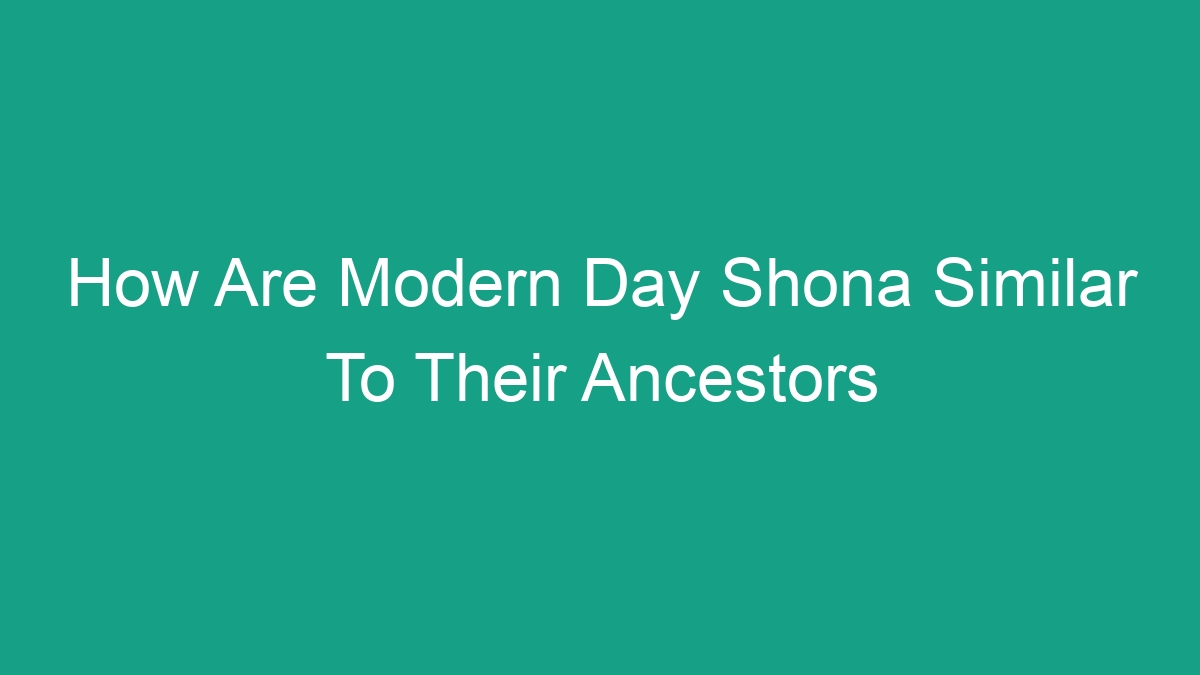
The Shona people are a Bantu ethnic group native to Zimbabwe and southern Zambia. They have a rich history and culture that dates back thousands of years. Despite the modernization and changes that have occurred over time, the modern day Shona still share many similarities with their ancestors.
Similarities in Language and Communication
- Use of the Shona language: The modern day Shona people still speak the Shona language, which has been passed down through generations. Although there may be some variations in dialects and vocabulary, the core language remains the same.
- Emphasis on oral tradition: Both modern day Shona and their ancestors place importance on oral tradition as a means of communicating history, stories, and cultural values.
Despite the influence of modern technology and globalization, the Shona people have managed to preserve their language and oral traditions, allowing them to maintain a strong connection with their ancestors.
Religious and Spiritual Beliefs
- Adherence to traditional beliefs: Many modern day Shona still hold traditional religious and spiritual beliefs that have been passed down from their ancestors. These beliefs often include a connection to ancestral spirits and the natural world.
- Use of traditional rituals and ceremonies: The practice of traditional rituals and ceremonies is still prevalent among the modern day Shona, reflecting the continuity of religious and spiritual practices from their ancestors.
While Christianity and other religions have made an impact on the Shona people, traditional beliefs and practices remain deeply ingrained in their culture, showcasing the enduring influence of their ancestors.
Social Structure and Community Values
- Importance of community: Both modern day Shona and their ancestors prioritize communal living and support systems within their villages and families.
- Respect for elders and traditional leadership: The respect for elders and traditional leaders continues to be a fundamental value among the modern day Shona, echoing the societal structure of their ancestors.
The sense of community and the emphasis on respecting traditional leadership and elders are aspects that have remained consistent through generations, showcasing the enduring legacy of Shona social structure and values.
Occupational Practices and Artistic Expression
- Agricultural livelihood: The modern day Shona still engage in agricultural practices similar to their ancestors, utilizing farming techniques that have been passed down through the ages.
- Artistic traditions: The artistic expressions of the Shona people, such as stone carving and storytelling, continue to thrive in the modern day, reflecting the enduring artistic heritage of their ancestors.
Despite the changes in lifestyle and advancements in technology, the occupational practices and artistic expressions of the Shona people remain connected to their ancestral roots, serving as a testament to their cultural continuity.
FAQs
1. What are the major subgroups of the Shona people?
The Shona people are comprised of various subgroups, with the major ones including the Zezuru, Karanga, Manyika, Ndau, and Korekore. Each subgroup has its own distinct traditions and dialects, contributing to the diversity within the Shona ethnic group.
2. How has modernization impacted Shona culture?
Modernization has undoubtedly brought changes to Shona culture, influencing aspects such as education, technology, and urbanization. While some traditional practices have evolved or diminished, the core values and cultural identity of the Shona people continue to be upheld in the modern era.
3. What role do ancestors play in Shona culture?
Ancestors hold significant importance in Shona culture, serving as guardians and sources of wisdom. The Shona people honor their ancestors through various rituals and ceremonies, believing in the continuation of their presence and influence in daily life.



